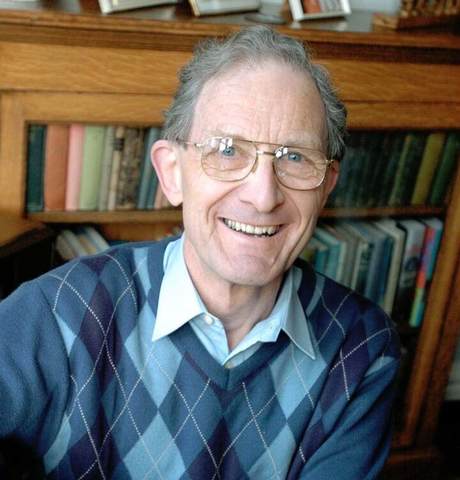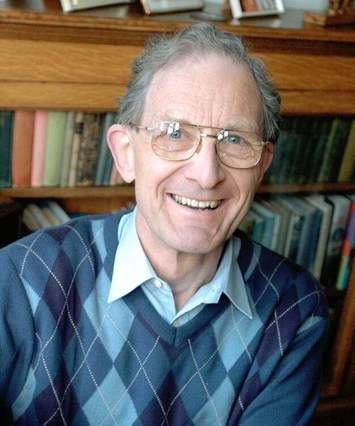We’ve already heard about Gerald’s desire to inspire people to work together and build bridges between individuals and communities to promote racial equality in Liverpool and elsewhere. Gerald’s story actually began in Ealing, London on 7 July 1934, when he was born and joined his brother Michael who was 2 years older than him. During WWII the brothers were evacuated to the United States where they lived, for the duration of the war, with a wonderful family who looked after them as if they were their own. It instilled in them both a great affection for America.
On their return in 1945 they had to get to know their parents again, not at all easy on both sides. But during those years apart their parents had met the work of Moral Rearmament (MRA). Its very practical Christian basis helped in the rebuilding of their family life. The brothers embraced the ideas of MRA: that if you wanted to see a change in the world the best place was to start with yourself, and that God had a plan for everybody’s life and He would show you that plan if you took time every day, to let Him into your life and ask for his guidance. This practise of taking time in quiet every day to seek God’s guidance and applying absolute standards of honesty, purity, unselfishness and love - as yardsticks of a life of integrity - became a cornerstone of their family life.
After leaving Mill Hill School, Gerald (a German speaker) was invited to Germany as part of an MRA stage crew travelling around Germany with plays. He lived for a while in the home of a German coal miner in the industrial area of the Ruhr, sleeping in his kitchen. As the miner had to leave for work very early in the morning, Gerald had ample time for his morning quiet time as he searched each day for God’s direction in his life and how to help. This experience of being in Germany, while an ideological battle was going on for the soul of Germany, was a momentous learning experience for him. He later travelled as part of the stage crew with a German play “Hofnung” that went to Japan and India.
After Germany, Gerald went to West Africa, mainly in Nigeria and Ghana. He stayed on for a further 16 years making lasting friendships. He also worked in Sudan, South Africa and Zimbabwe at different times. Quite a bit of his work involved stage productions, working backstage – often having to build the stage first. He was part of the team involved in the creation of one of those plays called “Freedom”, written and acted by Africans, which was then used world-wide. In Nigeria, The Chief Superintendent every week sent 30 trainee police officers to receive training using MRA films. These films were also used for training in schools and colleges. In Ghana, Gerald became a close friend of the Tolan Na, one of Ghana’s senior chiefs, member of Parliament and President of the Northern Territory’s Council who did a lot to unite the different factions in the government. (pictures of the Gerald with the cast of “freedom” and the Tolan Na are on the back of the order of service).
Gerald and Judith had both been independently working with MRA, without crossing paths much. Both had made the same decision to let God tell them what He wanted them to do in every aspect of their lives and that included marriage. Their courtship was not like most courtships. One day when Gerald was back in England, he had the thought in his quiet time that Judith Sykes was the girl he was meant to marry, but not to do anything about it as Judith herself was then in Nigeria and it would give her a shock.
Judith returned from Nigeria to an International conference in Switzerland accompanying a group of Nigerian Ladies who had never travelled to Europe and needed looking after. The first night there she woke up in the middle of the night with the astonishing thought “if Gerald Henderson ever proposes to you say yes”. Gerald attended the same conference not knowing Judith was there and after a few days he obeyed the thought he had to propose to her. He thought she would need some time to think about it. But he was amazed and delighted that she immediately said yes.
As they got to know each other, they discovered that they had a lot in common and it became clear very quickly that they were meant for each other. They married 2 months later and left for Nigeria working together there for another 6 years. One friend who worked with them in Nigeria during those early marriage years wrote “you were both so full of kindness and patience. Gerald was very deeply devoted to you ..… I can still see his ‘can’t believe my luck smiling eyes’ when you were present”.
When Gerald and Judith first came back to the UK they spent 5 years at the MRA conference centre in Cheshire. It was from there, just after the 1981 riots, that they both had the thought to move to Liverpool and that they were meant to work with those who wanted to make Liverpool a city of hope. They came with the idea of staying at least 10 years but have remained here ever since. We have already heard about the work they have been involved in Liverpool. Gerald and Judith used their home constantly to bring people together, welcoming guests from many countries which they then also visited. This meant their outreach and impact was much wider than just Liverpool. We have already heard in the other tributes of the links with Richmond Virginia in USA and the reconciliation work of ‘Hope in the Cities”. There are many stories I can recount of their visits and impact in other cities, but I will pick one which is typical of their contribution in many settings.
In the 1980s, Gerald expressed the desire to visit Belfast to listen and understand how he could be used to build bridges in this critical situation. His catholic host, speaking of his visit, told me, “He came at a time when talking was at a premium and risked his own life by visiting. He met with a wide cross section of people at a deeply difficult time: Catholic priests, a Methodist minister, paramilitary men. Gerald was a good listener: his body language, face and whole manner was listening. He lived the standards he wished to see in the world, which meant people could see he was a genuine, authentic Englishman with no malice. He was a man of a few words, with a gentle voice when he did speak - what he said was pertinent, relevant and life changing. People opened up to him, talked deeply with him because he was quickly trusted. He was a true friend, who kept in touch with people - a prince among men”.
Gerald was a wholehearted humble, gracious gentleman, who treated all people with dignity and respect, regardless of their background or colour. His genuine, understated, quiet care made him a real friend to so many. He had an infectious warm smile. He was steadfast in his care for people and lived a life dedicated to serving others and working for a better world for everyone. Gerald was not a sentimental man. He didn’t need to be. His whole gentle gracious persona and demeanour showed you, in action, that he cared and valued you.
As his memory started to fail him, he never lost his sense of humour and his peacefulness only occasionally deserted him. With a smile on his face, he would remind us that “Judith was his memory now”.
As his illness progressed it did not stop him from his natural care for people: there was still always the warm welcome at the door, the serving of tea or coffee, the quick clearing away of tables and washing up (whether in his own home, a guest in someone else’s home or after church events). He remained a sensitive host; he may not have known who his guests were, but he would still welcome them meticulously and make them feel at home. Whatever his memory failings, you would be hard pressed to beat him at Rummicub!
Despite his progressive illness, Gerald retained his sense of peace. His trust in God was absolute and until the end he took time each morning to sit in quiet with his notebook waiting to capture any guidance for his day, listening to God in prayerful presence, even if no clear thoughts came to be written in his book. Another source of peace was the presence at his side of his soulmate. Judith’s tremendous support and quiet unobtrusive care made him feel safe and enabled Gerald to live life to the full, caring for others till the end.
As their overseas travel diminished with his illness, the last few years were full of yearly trips by car covering all corners of the UK visiting old friends. To occupy his time and mind, Judith developed a meticulous production line recycling cards (you didn’t have to go to a shop for cards for any special occasion as you could purchase them from their production line which raised £1200 for their charity funds Asylum link Merseyside and Dementia Support). Coffee and deserts became a shorter way to continue to host friends, old and new. Prompted by a question from Judith or their guests ,Gerald shared with clear memory experiences from his earlier travel, inspiring others by his amazing life stories.
Behind every great man is an equally formidable woman. In Gerald and Judith case, they walked side by side, for nearly 50 years. Soulmates, brought together by God, who together touched so many lives by their commitment to seeking the guidance of God in every aspect of their lives, forming deep friendships and inspiring so many. Those of us, who lived alongside them in Liverpool, were the really lucky ones as our lives were enriched by their friendship and care.
We all give thanks for Gerald’s well lived life doing so much, faithfully serving God.
Gracious, gentleman of reconciliation and peace – may you rest in peace.
English


